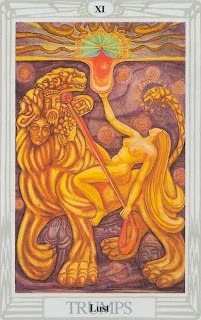Lose Something? Finding Lost Objects with Tarot
Usually, a quick verse to St Anthony is my go-to when I lose something, which is far more often than most other people I know. It goes like this: St Tony, St Tony Please come around Something's lost That needs to be found That's what I say, anyway. You can also do a quick reading to see where your lost item it. For example, I once lost a Tarot card (ironic?) and pulled one card after wondering where it could have went. As usual, I was using a Thoth deck. I pulled a 4 of wands, and found the card in my laundry room, in a round basket near the dryer. Luckily, I didn't wash it! It must have fallen in while moving my laundry from my room to the washer. When I draw the World card after losing something, I know it is gone for good. Out in the world, I guess. I have extensively searched for lost items even after drawing the World card, and always without any luck. Drawing the Star card has resulting in finding lost object in the bathroom. Using Tarot to find lost obje



